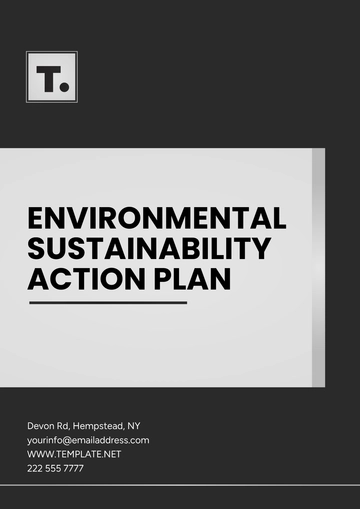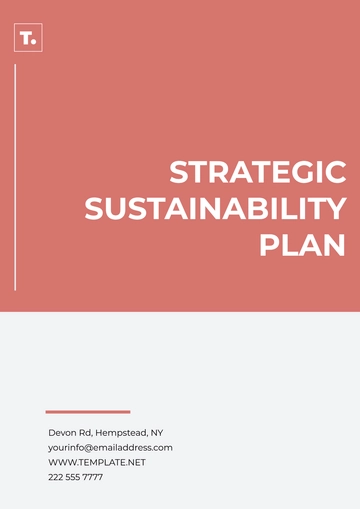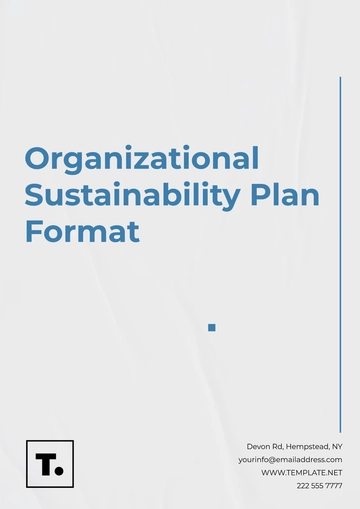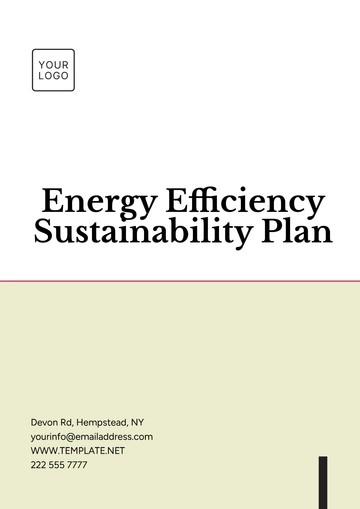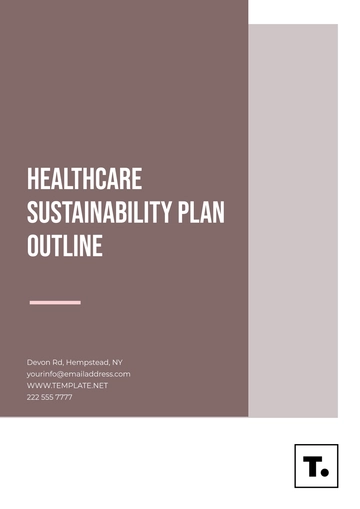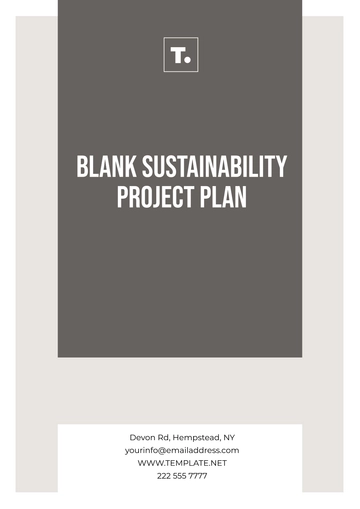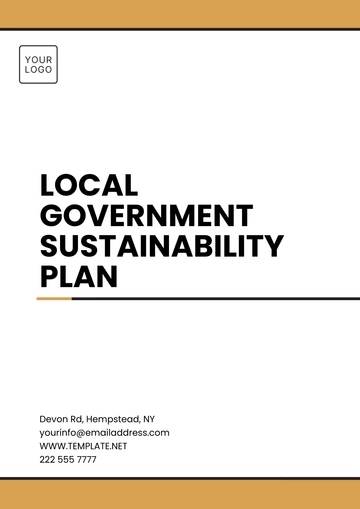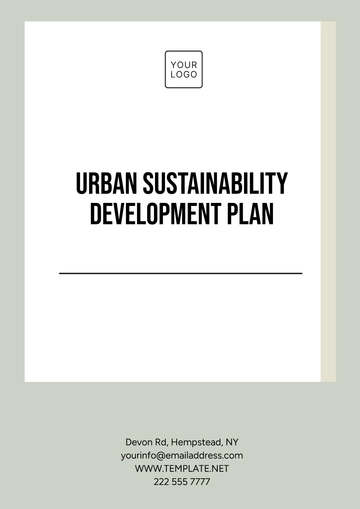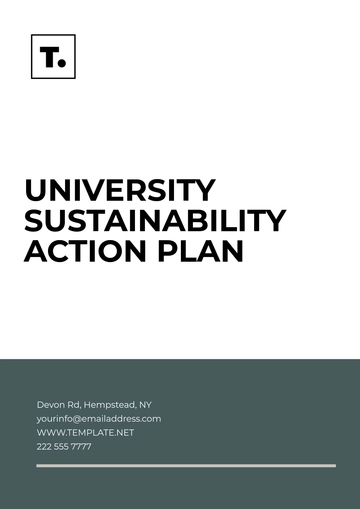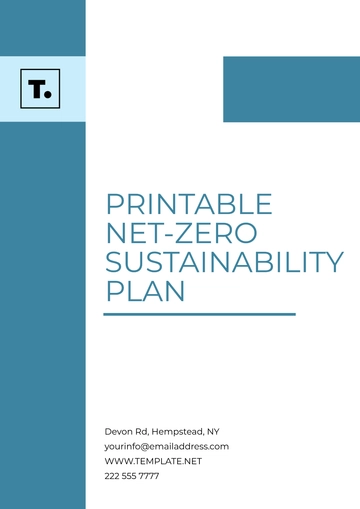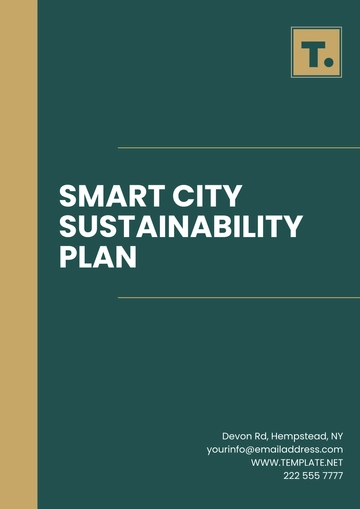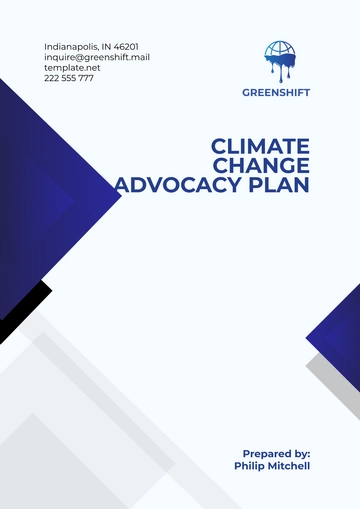Free Smart City Sustainability Plan
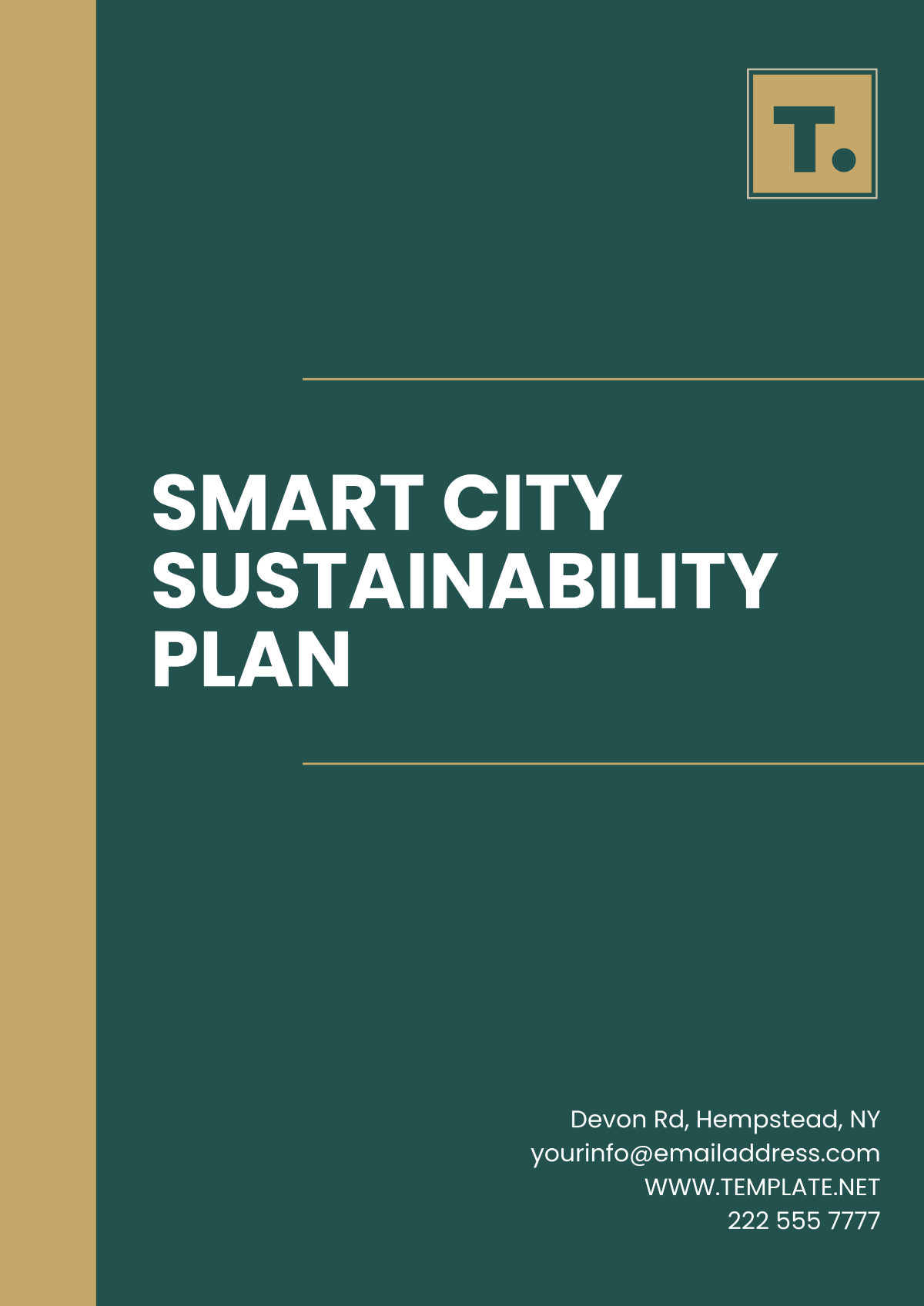
Date: [Date]
Prepared By: [Your Name]
1. Introduction
This Smart City Sustainability Plan outlines the vision, objectives, and key initiatives aimed at creating a sustainable urban environment through the use of advanced technologies and data-driven solutions. By focusing on environmental preservation, economic growth, and social inclusivity, the plan aims to enhance the quality of life for residents while reducing the city's carbon footprint.
2. Vision Statement
To create a smart, sustainable, and resilient city that uses technology to address urban challenges, improve quality of life, and ensure a sustainable future for all its residents.
3. Objectives
Environmental Sustainability: Reduce energy consumption, minimize waste, and promote the use of renewable resources.
Social Sustainability: Enhance social equity, improve public services, and foster community engagement.
Economic Sustainability: Promote innovation, create green jobs, and support sustainable business practices.
4. Key Strategies
Energy Management:
Implement smart grids and energy-efficient buildings to reduce overall energy consumption.
Promote the use of renewable energy sources, such as solar and wind, to power public facilities and infrastructure.
Install smart meters and sensors to optimize energy usage across the city.
Waste Management:
Adopt smart waste management systems to streamline waste collection and recycling processes.
Use sensors to monitor waste bins and improve collection routes, ensuring efficient use of resources.
Encourage residents to reduce, reuse, and recycle through smart technologies.
Water Management:
Deploy smart water meters to monitor and manage water usage in real-time.
Implement rainwater harvesting systems and improve stormwater management to reduce flooding and conserve water.
Encourage the use of water-efficient appliances and irrigation systems.
Transportation and Mobility:
Develop smart transportation networks that integrate electric vehicles (EVs), autonomous vehicles, and shared mobility solutions.
Create pedestrian-friendly pathways and cycling lanes to promote sustainable transportation modes.
Implement traffic management systems that use real-time data to reduce congestion and optimize vehicle flow.
Green Spaces and Biodiversity:
Develop urban green spaces and parks using sustainable landscaping practices.
Integrate green roofs, urban farming, and vertical gardens into city infrastructure.
Preserve biodiversity by creating wildlife corridors and minimizing urban sprawl.
Digital Infrastructure:
Build a robust digital infrastructure that enables data collection, analytics, and real-time decision-making.
Use Internet of Things (IoT) sensors to monitor air quality, noise levels, and other environmental factors.
Promote the use of smart technologies to improve public services, such as healthcare, education, and safety.
5. Implementation Plan
The implementation of the Smart City Sustainability Plan will occur in phases over the next five years. The timeline will include:
Phase 1 (Year 1-2): Infrastructure development, smart grid implementation, and waste management system installation.
Phase 2 (Year 3-4): Expansion of renewable energy projects, smart transportation systems, and water management initiatives.
Phase 3 (Year 5 and beyond): Full integration of digital infrastructure, green space development, and community engagement programs.
6. Stakeholders and Partnerships
Government: Local government authorities will lead the planning, policy implementation, and funding for the initiatives.
Private Sector: Technology companies, infrastructure providers, and energy firms will collaborate on smart city solutions and innovations.
Community: Residents will be engaged through outreach programs, public consultations, and partnerships with local organizations to ensure inclusivity and support for the plan.
Academia: Research institutions will contribute to data analysis, environmental studies, and the development of new technologies.
7. Funding and Resources
The plan will be funded through a combination of government grants, private sector investment, and international sustainability programs. Public-private partnerships will play a key role in financing large-scale projects, particularly in energy, transportation, and infrastructure development.
8. Monitoring and Evaluation
A comprehensive monitoring and evaluation framework will track the progress of each initiative, measure outcomes, and identify areas for improvement. Regular reports will be published to ensure transparency and accountability.
Key performance indicators (KPIs) will include:
Reduction in carbon emissions
Increase in renewable energy usage
Improvement in waste recycling rates
Growth in green jobs
Public satisfaction and engagement levels
9. Conclusion
The Smart City Sustainability Plan represents a forward-thinking approach to urban development. By integrating technology, sustainable practices, and community involvement, this plan aims to create a vibrant, sustainable, and resilient urban environment that benefits all stakeholders.
- 100% Customizable, free editor
- Access 1 Million+ Templates, photo’s & graphics
- Download or share as a template
- Click and replace photos, graphics, text, backgrounds
- Resize, crop, AI write & more
- Access advanced editor
The Smart City Sustainability Plan Template, offered by Template.net, is the ideal solution for urban planners and sustainability experts. This fully customizable template allows you to design a sustainable future for your city with ease. Downloadable and printable, it is also editable in our AI Editor Tool, making it simple to adjust and update the plan to meet your city's specific needs.
You may also like
- Finance Plan
- Construction Plan
- Sales Plan
- Development Plan
- Career Plan
- Budget Plan
- HR Plan
- Education Plan
- Transition Plan
- Work Plan
- Training Plan
- Communication Plan
- Operation Plan
- Health And Safety Plan
- Strategy Plan
- Professional Development Plan
- Advertising Plan
- Risk Management Plan
- Restaurant Plan
- School Plan
- Nursing Home Patient Care Plan
- Nursing Care Plan
- Plan Event
- Startup Plan
- Social Media Plan
- Staffing Plan
- Annual Plan
- Content Plan
- Payment Plan
- Implementation Plan
- Hotel Plan
- Workout Plan
- Accounting Plan
- Campaign Plan
- Essay Plan
- 30 60 90 Day Plan
- Research Plan
- Recruitment Plan
- 90 Day Plan
- Quarterly Plan
- Emergency Plan
- 5 Year Plan
- Gym Plan
- Personal Plan
- IT and Software Plan
- Treatment Plan
- Real Estate Plan
- Law Firm Plan
- Healthcare Plan
- Improvement Plan
- Media Plan
- 5 Year Business Plan
- Learning Plan
- Marketing Campaign Plan
- Travel Agency Plan
- Cleaning Services Plan
- Interior Design Plan
- Performance Plan
- PR Plan
- Birth Plan
- Life Plan
- SEO Plan
- Disaster Recovery Plan
- Continuity Plan
- Launch Plan
- Legal Plan
- Behavior Plan
- Performance Improvement Plan
- Salon Plan
- Security Plan
- Security Management Plan
- Employee Development Plan
- Quality Plan
- Service Improvement Plan
- Growth Plan
- Incident Response Plan
- Basketball Plan
- Emergency Action Plan
- Product Launch Plan
- Spa Plan
- Employee Training Plan
- Data Analysis Plan
- Employee Action Plan
- Territory Plan
- Audit Plan
- Classroom Plan
- Activity Plan
- Parenting Plan
- Care Plan
- Project Execution Plan
- Exercise Plan
- Internship Plan
- Software Development Plan
- Continuous Improvement Plan
- Leave Plan
- 90 Day Sales Plan
- Advertising Agency Plan
- Employee Transition Plan
- Smart Action Plan
- Workplace Safety Plan
- Behavior Change Plan
- Contingency Plan
- Continuity of Operations Plan
- Health Plan
- Quality Control Plan
- Self Plan
- Sports Development Plan
- Change Management Plan
- Ecommerce Plan
- Personal Financial Plan
- Process Improvement Plan
- 30-60-90 Day Sales Plan
- Crisis Management Plan
- Engagement Plan
- Execution Plan
- Pandemic Plan
- Quality Assurance Plan
- Service Continuity Plan
- Agile Project Plan
- Fundraising Plan
- Job Transition Plan
- Asset Maintenance Plan
- Maintenance Plan
- Software Test Plan
- Staff Training and Development Plan
- 3 Year Plan
- Brand Activation Plan
- Release Plan
- Resource Plan
- Risk Mitigation Plan
- Teacher Plan
- 30 60 90 Day Plan for New Manager
- Food Safety Plan
- Food Truck Plan
- Hiring Plan
- Quality Management Plan
- Wellness Plan
- Behavior Intervention Plan
- Bonus Plan
- Investment Plan
- Maternity Leave Plan
- Pandemic Response Plan
- Succession Planning
- Coaching Plan
- Configuration Management Plan
- Remote Work Plan
- Self Care Plan
- Teaching Plan
- 100-Day Plan
- HACCP Plan
- Student Plan
- Sustainability Plan
- 30 60 90 Day Plan for Interview
- Access Plan
- Site Specific Safety Plan

